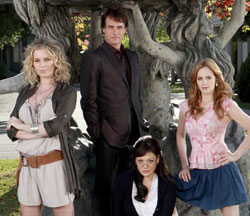![[large][AnimePaper]wallpapers_RahXephon_elfe-noire43_39131.jpg](https://wp-media.beliefnet.com/sites/87/import/%5Blarge%5D%5BAnimePaper%5Dwallpapers_RahXephon_elfe-noire43_39131.jpg) Last year I wrote about the predictability of rock radio’s holiday countdowns of the best songs ever, which, seemingly by an Act of Congress, year after year anointed Led Zeppelin’s “Stairway to Heaven” the Greatest Tune Ever Played. This Labor Day weekend, WRXP, a radio station in New York, broke “Stairway”‘s hold.
Last year I wrote about the predictability of rock radio’s holiday countdowns of the best songs ever, which, seemingly by an Act of Congress, year after year anointed Led Zeppelin’s “Stairway to Heaven” the Greatest Tune Ever Played. This Labor Day weekend, WRXP, a radio station in New York, broke “Stairway”‘s hold.
Zeppelin frontman Robert Plant has long since clarified that his lyric refers not to the afterlife but the good life. But there’s nonetheless a bit of ironic yin-yang in WRXP’s replacement at the head of the class: the 1979 apocalyptic punk anthem, “London Calling,” by The Clash. “Now war is declared, and battle come down,” The Clash rant, in what sounds like a scene out of, if not The Golden Compass or the Narnia series, then certainly Left Behind.
It’s anyone’s guess how precisely “Stairway” got toppled–not only from the top ranking, but all the way to no. 991 on WRXP’s list. All rock stations claim that they generate their holiday countdown lists from listeners’ recommendations. WRXP varied the gag by asking listeners for their favorite twenty songs of all time. Ostensibly, this process cast the nets wider and culled out gimmes like “Freebird,” tamped down old chestnuts like John Lennon’s “Imagine,” (no. 22) and represented Led Zep with its much tougher “Ramble On,” at no. 6.
List mavens like myself can debate whether RXP’s methodology alone, and not prejudice in their tallying, was really what banished the usual suspects from their top-ten. (When one listener called in late in the weekend to note the freakish absence of “Freebird,” a DJ sniffily reminded her that this list wasn’t your daddy’s top-song countdown.) Let’s remain agnostic, so to speak, on the point. Suffice it to say that when Clapton’s “Layla,” normally a top-5 shoo-in, played at no. 71, ears were pricked for a revolution. When The Smiths played at no. 3, jaws dropped. As the opening chords of “London Calling” rang out at dusk, the post-barbecue racket where I was fell silent in amazement.
Is it just the passing of a generation or does “London Calling”‘s ascendance hold some darker meaning? Full of policemen’s truncheons and rising water levels, “London Calling” is not a flattering picture of our society at the end of history. The moral lassitude of Zeppelin’s song–it concerns a woman couching herself in luxury with no thought of giving back–seems quaint when compared to the crumbling The Clash foretell, and even seem to revel in:
The ice age is coming, the sun’s zooming in
Engines stop running, the wheat is growing thin
A nuclear error, but I have no fear
‘Cause London is drowning, and I live by the river.
No stairway indeed.


